Rio calling: Sophie Hahn prepares for Paralympic dream - a special feature
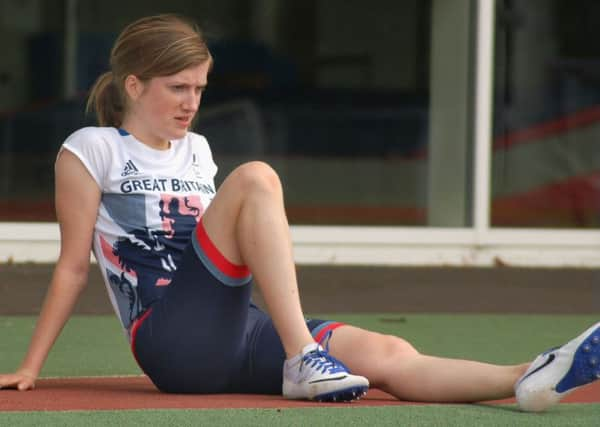

Melton Times sports editor Chris Harby catches up with Sophie at a pre-Games training session and discovers nothing is taken for granted.
Despite careful planning, our arrival at the Loughborough University High Performance Athletics Centre, or Hipac, is unexpected. This is not good.
Advertisement
Advertisement
Joe McDonnell is just about to start a training session with Sophie Hahn and a small group of fellow Paralympic medal prospects.
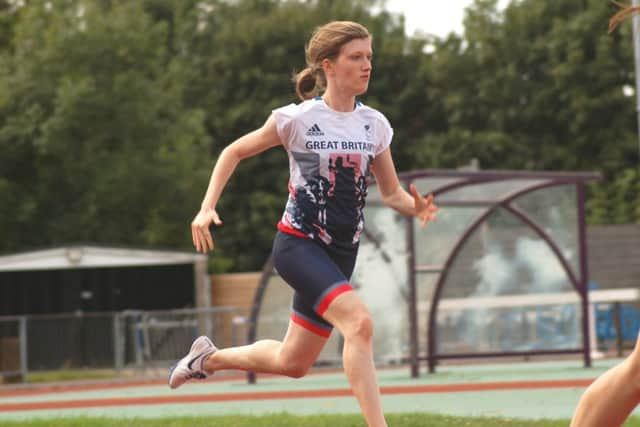

Just a handful of weeks out from their biggest championships of all, the coach would be fully justified in issuing the order to sling our hooks.
But none of it. The interview must wait, but in the meantime, we hunker down to see how a major games contender is prepared.
It’s quiet at the Hipac - a place which would have been awash with tension and testosterone just a few weeks before when the Olympians were at home.
Advertisement
Advertisement
But late on a Thursday afternoon, the mood is probably about as laidback as this hi-tech temple to track and field gets.
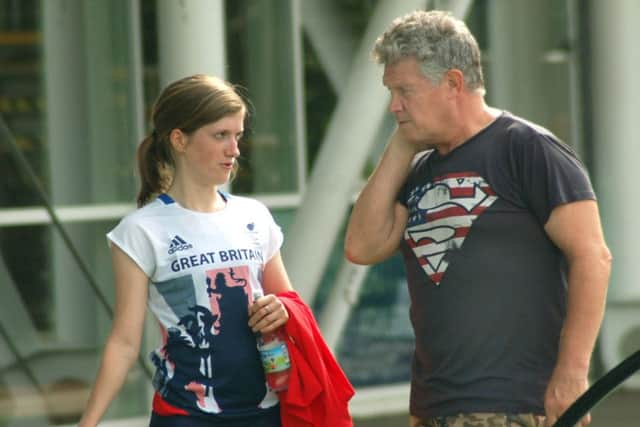

McDonnell, an avuncular figure to his athletes, greets us in knee-length camouflage shorts and a Superman T-shirt.
He offers jokes, asides and gentle encouragement to his pupils in his Irish brogue; it all seems remarkably informal.
“The ethos of this group is all about supporting one another, but the one essential is being able to have a laugh,” he says.
‘If you’re miserable, go and find somewhere else to train.”
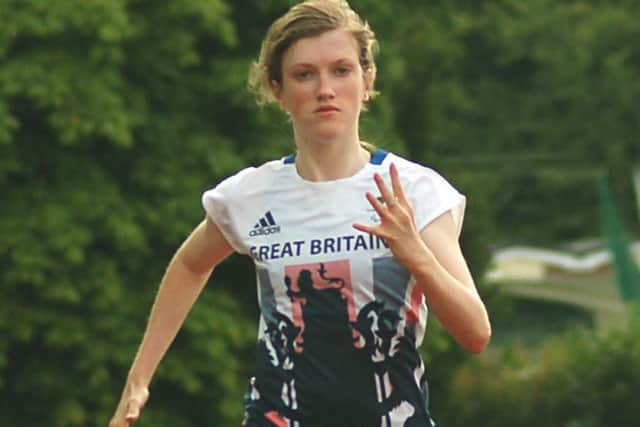

Advertisement
Advertisement
But do not be fooled, amid the banter there is pain enough here to underline how serious a business this is.
Today the group is asked to complete three sets of two back-to-back 150m sprints.
As they go deeper into the session, one by one all of the runners, except Hahn it would seem, are all reacquainted with an earlier meal - and then sprint some more.
Images of spent runners vomiting are never used in flashy ads for giant sportswear corporations.
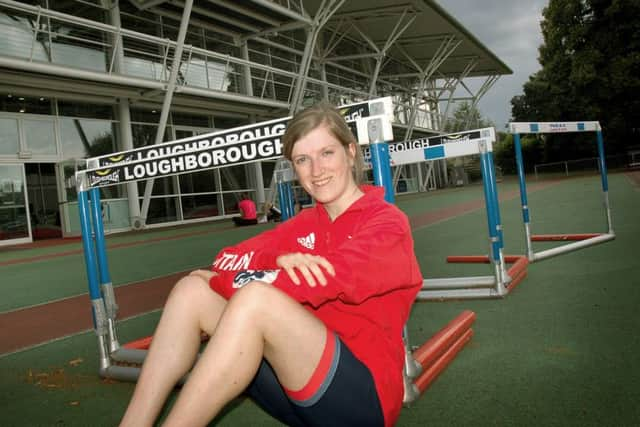

Advertisement
Advertisement
Nor used in moody preview pieces on TV, replete with all that jarring poetry and flummery.
But you don’t win major championship medals without such ugly side-effects.
After every run, McDonnell asks each athlete in turn how they feel. He trusts their answers.
Hahn likes the fact her coach is a good listener.
In turn they respect and trust him enough to run themselves into the ground at the drop of a hat.
Advertisement
Advertisement
“As a coach, knowing your athlete is the most important thing in the world,” he said.


“Sophie and I have a very honest relationship.
“I never use the word disability. Their ability is fantastic so I don’t change any of my training just because the athletes have got a perceived disability.”
Listening to her feedback after the second set of reps, McDonnell decides to ease off and allows Hahn to end the afternoon on a positive.
Just the back-to-back 100m sprints instead.
Now we see a glimpse of the double world champion in competition mode, albeit without blocks and not at full pelt.
Advertisement
Advertisement
Hahn is anything but the intimidating, muscular specimen we may associate with powerful sprinters.
Her ideal race weight for Rio will be 47kg - a shade over 7st 1lb in old money.
She is almost waif-like, but feared deeply by all opponents.
When the whistle blows, the calves and feet spring into action, propelling her dramatically from crouching start into the drive.
Advertisement
Advertisement
Building speed, Hahn is quickly into phase two: the transition.
Gradually uncoiling and straightening the torso, her legs work furiously to an impossibly quick rhythm.
The feet pad lightly down the track, skimming the synthetic surface and avoiding any unnecessary resistance to the precious acceleration.
All is done smoothly and with a simplicity which belies the work put in to perfect this crucial technique.
Advertisement
Advertisement
Countless drills have been completed and tweaks made during Hahn’s sprinting infancy to correct her balance: the major anathema for athletes with cerebral palsy.
Almost halfway down the track in a handful of seconds, and acceleration has reached its peak. Now we’re into the killer finale: maximum speed.
For those who, quite forgivably, believe sprinters go hell-for-leather from gun to tape, there are tactics to this game. Even in 13 seconds.
There are strategies to outmanoeuvre your opponents, and they earned the 19-year-old Hahn a European gold medal this summer.
Advertisement
Advertisement
The key to world-class sprinting, it seems, is limiting your losses.
“Everyone knows Sophie has a strong start, so in Italy they all went out fast,” McDonnell recalls.
“But this meant they were already decelerating by the time Sophie was into her maximum speed.
“She doesn’t hit that until 40 metres, so in effect she is only decelerating for 30 metres.”
And with that, the session is over.
Advertisement
Advertisement
It’s still Loughborough; figuratively, if not literally, a million miles away from the exotic, enigmatic Brazilian city.
But it’s another milestone ticked off toward the rapidly-approaching horizon of Rio.
“This year has gone phenomenally quickly,” Hahn reflects as she warms down, checking with touching consideration whether I’m okay to write and walk at the same time.
“Now I just need to do a bit more training.
“We had the Europeans in June, but I knew afterwards it was going to ramp up.
Advertisement
Advertisement
“I will taper down, but I just need to polish up a few things like technique, intensity and speed.”
Of the six daily sessions per week, the 150m reps, is her least favourite.
From the bodily malfunctions I’ve witnessed, understandably so.
Winter training is another slight bug bear, but she is unlike many of us who prefer the glory without the graft and grind.
Advertisement
Advertisement
“I enjoy training, the technical sessions are fun,” she said. “And I like saying hello to all the Olympians when they’re around.
“Joe is quite funny, too, and it’s nice being in a group.
“But I’m not a fan of the 150m session - it’s pretty difficult.
“The lactic just builds up through my legs. You know it’s going to be painful, but you have to remember your goals.”
With the dominance Hahn has enjoyed since her explosive burst to prominence in 2013, it would be easy to allow in a little complacency.
Particularly so after the last 12 months.
Advertisement
Advertisement
Last October she became the first female T38 100m runner in history to break the 13-second barrier at the IPC World Championships in Qatar.
Her astonishing performance in the Doha final was Usain Bolt-like in its proportions and sense of occasion.
Taking four-tenths of a second off her own world best - a gaping chasm in 100m terms - she lowered her own record to 12.60secs.
It was the most emphatic and dominant defence of that breakthrough title of 2013.
Advertisement
Advertisement
But there is a professionalism and hunger here, ignited perhaps by an athlete’s dread fear of failure.
Every possible preparation must be completed, no matter what success has gone before.
Opponents are given due, and genuine, respect.
Disappointingly, Hahn’s chief threat, Maria Goncharova, is unlikely to race; a fall guy of the blanket ban on Russian athletes for state-sponsored doping.
Yet still nothing will be taken for granted.
“My class is very competitive,” she adds. “There are potentially six athletes who could go under 13 seconds - I just have to go out and do my best.
Advertisement
Advertisement
“It would be amazing to win a medal; I’m just training very hard to try and do that.”
Of course, when she says medal, she means medals - Hahn is also expected to anchor Britain’s 4x100m relay team.
And although unspecified here, only one colour matters.
Her disappointment at winning three European Championship silver medals in 2014, tells you all you need to know about Hahn’s high expectations.
Form suggests that unlike that week in Swansea she will not leave downcast this time.
Advertisement
Advertisement
But another Bolt-like performance in Rio is far from the primary focus.
“It would be great if I could get the world record, but I’m just looking to cross the line first,” she says.
“A record would be a bonus and all depends on conditions, too.”
The leap of imagination required to take in Hahn’s sporting fairytale is vast.
Advertisement
Advertisement
Hollywood scriptwriters would screw up the idea and hurl it at the waste paper basket. No-one would believe that.
Her build-up to London 2012 probably amounted to little more than scouring the TV schedules and getting the right snacks in.
Yet within a handful of months, the shy college student, who watched wide-eyed as Jonnie Peacock and Richard Whitehead stormed to Paralympic gold, had become the epitome of Seb Coe’s legacy mantra.
Having been coerced by elder brother Jamie towards a Talent ID drive at Loughborough, the following summer she was a global champion and world record holder.
Life is unrecognisable from its former self.
“My life has changed very much,” she added.
Advertisement
Advertisement
“It’s crazy; it’s all happened so fast. I never imagined I would be going to the Games.
“Not many people can say they have been to the Paralympics or Olympics.”
Remarkably for the fastest-ever T38 female, and contrary to her steely on-track demeanour, confidence is still an asset to be fully mastered.
Off-the-track Hahn, modest, polite and unassuming, and the athlete staring dead-eyed down the track waiting for starter’s orders, are two very distinct propositions.
Advertisement
Advertisement
She explained: “I’m still quite shy in myself, but as an athlete you have to be more confident.
“I enjoy the competition and I’m very passionate about my sport.”
This fierce competitive instinct was spotted at that first fateful meeting by McDonnell, convincing him she had the necessary tools.
But promise and potential will only get you so far.
A reputation as an overnight sensation may carry assumptions that such success was already inbuilt and came easily.
Advertisement
Advertisement
But the building blocks had to be carefully and patiently laid by McDonnell, along with strength and conditioning coach Sam Heathcote.
“Athletes have to work far harder when they have cerebral palsy,” McDonnell explained.
“Often there is a lot of poor movement that has been learnt.
“My job is to strip all of that away; it’s exactly what I did with Sophie.
Advertisement
Advertisement
“Her biggest issue was balance and for the first two years we just worked on that.”
One of the most obvious examples was her initial struggles with the sprinter’s stock in trade, the blocks.
Her first world title was won despite the handicap of a standing start.
McDonnell said: “Sophie’s fourth or fifth race was in the world championships so most of her learning has very much been done in public.
Advertisement
Advertisement
“At her first Anniversary Games she just about staggered out of the blocks, but a club athlete would have learned all of that at a club meet.
“Then there is diet and exercise. Sophie has learned in three years what would take a lot of athletes eight years.”
And that education is likely to continue. The appetite for winning and the hunger to learn seem too strong to diminish once 2016 is put to bed.
Just as important, the willingness to work for that success, and not to assume it will appear gift-wrapped, still appears fresh.
Advertisement
Advertisement
“The closer we get to the games the intensity goes up, but it helps me to get even better,” she added.
“Sometimes you need that little extra push to become successful.”
Whatever happens in Rio - and as all athletes dread, anything can happen - McDonnell expects it to be just a base camp in his athlete’s overall expedition.
“We probably won’t see her best until Tokyo (2020),” he adds.
“Female athletes tend to peak between 24 and 26. We are still talking about what might happen.”